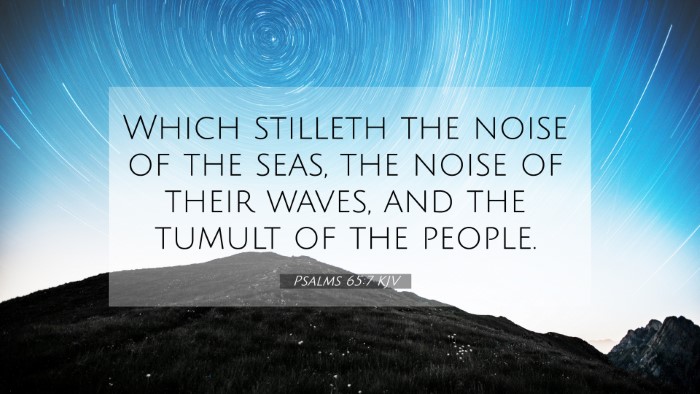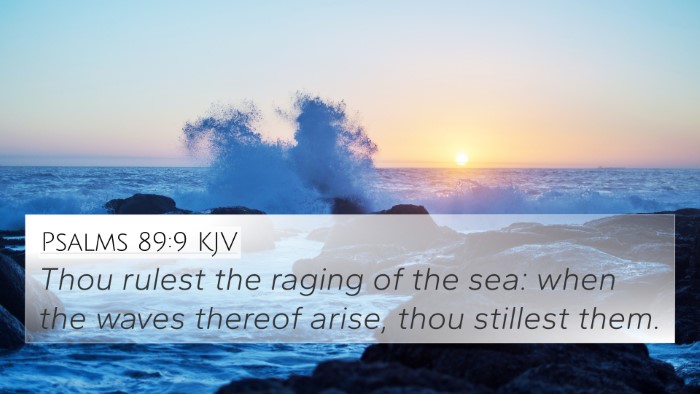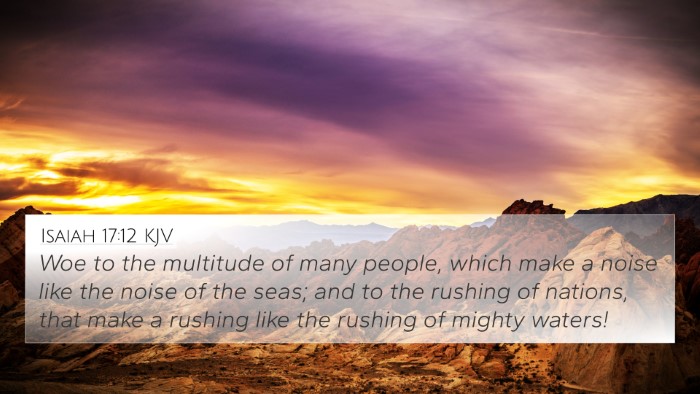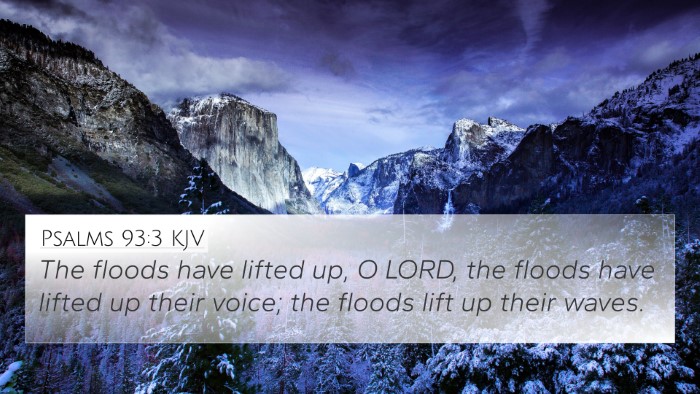Psalms 65:7 - Meaning and Commentary
Psalms 65:7 states: "You who still the noise of the seas, the noise of their waves, and the tumult of the peoples." This verse evokes the imagery of God's sovereign power over nature and humanity, emphasizing His ability to bring peace amidst chaos.
Key Insights from Public Domain Commentaries
Matthew Henry's Commentary:
Matthew Henry highlights God's role as the ultimate peacemaker, who calms the tumultuous seas, symbolizing His authority over creation. He draws a parallel between the physical calm of the seas and the emotional calm God can bring to troubled lives.
Albert Barnes' Notes:
Albert Barnes emphasizes the metaphorical significance of the seas and waves, interpreting them as representing the multitudes and nations of the earth. He underscores the idea that just as God controls the waters, He also governs the affairs of men, bringing tranquility to tumultuous situations.
Adam Clarke's Commentary:
Adam Clarke delves into the historical context, noting that this psalm appears to be a reflection on God’s past mercies and providence. He mentions that the "noise of the seas" relates not only to literal storms but also to the social or political upheavals that can distress humanity, reinforcing God's omnipotence in all realms.
Applications of Psalms 65:7
This psalm serves as a reminder for believers that in times of trouble, they can find solace in God’s power to quiet both external storms and internal strife.
Bible Verse Cross-References
- Mark 4:39: "And he arose, and rebuked the wind, and said unto the sea, Peace, be still." - This verse directly parallels the idea of Jesus calming the storm, demonstrating His divine authority over nature.
- Isaiah 57:20-21: "But the wicked are like the troubled sea, when it cannot rest, whose waters cast up mire and dirt. There is no peace, saith my God, to the wicked." - This passage contrasts the peace offered by God with the unrest of those who do not follow Him.
- Luke 8:24: "And they came to him, and awoke him, saying, Master, master, we perish. Then he arose, and rebuked the wind and the raging of the water: and they ceased, and there was a calm." - Reiterates God's control over chaotic elements.
- Psalm 89:9: "Thou rulest the raging of the sea: when the waves thereof arise, thou stillest them." - Affirms God's power over the sea, reinforcing the message in Psalms 65:7.
- 1 John 4:4: "Ye are of God, little children, and have overcome them: because greater is he that is in you, than he that is in the world." - Encourages believers that God's power within them can overcome external chaos.
- John 16:33: "These things I have spoken unto you, that in me ye might have peace. In the world ye shall have tribulation: but be of good cheer; I have overcome the world." - Highlights Christ's victory over turmoil, echoing the comfort of Psalms 65:7.
- Philippians 4:6-7: "Be careful for nothing; but in every thing by prayer and supplication with thanksgiving let your requests be made known unto God. And the peace of God, which passeth all understanding, shall keep your hearts and minds through Christ Jesus." - Suggests that prayer leads to divine peace amidst chaos.
Thematic Connections
Psalms 65:7 touches on the themes of divine sovereignty, peace, and the calming of chaos, which resonates deeply within both the Old and New Testaments. Through examining these themes, believers can understand the broader narrative of God’s control over creation and human affairs.
Tools for Bible Cross-Referencing
To explore deeper connections and understandings of scriptures, consider utilizing various tools, including:
- Bible Concordance: A resource for locating verses and understanding their context.
- Bible Cross-reference Guide: Facilitates finding related verses across the scriptures.
- Cross-reference Bible Study: Methods to analyze and compare linked scriptures effectively.
- Comprehensive Bible Cross-reference Materials: A collection of resources for deeper study.
Conclusion
Psalms 65:7 serves as a profound reminder of God's omnipotence over chaos, illustrating a theme found throughout scripture. Through careful study and cross-referencing, believers can draw parallels and insights that enhance their understanding of God's character and His workings in our lives.















